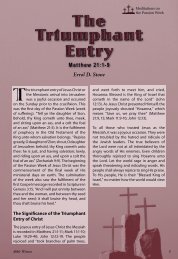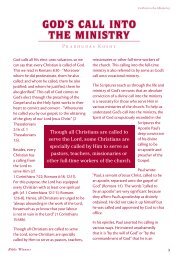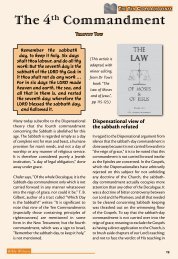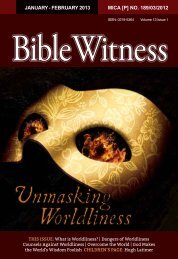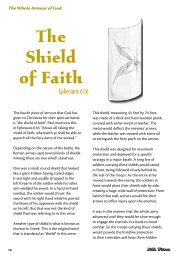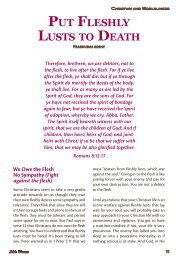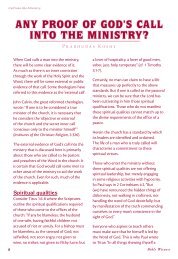The Cross Reconciles God's Love And His Wrath - Bible Witness
The Cross Reconciles God's Love And His Wrath - Bible Witness
The Cross Reconciles God's Love And His Wrath - Bible Witness
Create successful ePaper yourself
Turn your PDF publications into a flip-book with our unique Google optimized e-Paper software.
Meditations on<br />
the Passion Week<br />
<strong>The</strong> <strong>Cross</strong><br />
<strong>Reconciles</strong> Tan Kian Sing<br />
God’s <strong>Love</strong><br />
& <strong>His</strong> <strong>Wrath</strong><br />
John Calvin, in holding on to the<br />
fact that the death of Christ on the<br />
cross redeems men, wrote thus,<br />
“By <strong>His</strong> obedience, He has wiped off our<br />
transgression; by <strong>His</strong> sacrifice, appeased<br />
the divine anger; by <strong>His</strong> blood, washed<br />
away our stains; by <strong>His</strong> cross, borne our<br />
curse; and by <strong>His</strong> death, made satisfaction<br />
for us … in this way man is reconciled<br />
in Christ to God the Father, by no merit<br />
of his own, by no value of works, but by<br />
gratuitous mercy.”<br />
If anyone wishes to see God’s love, he<br />
must look at the cross, where the Lord<br />
Jesus died to save us. Likewise, if anyone<br />
wishes to see God’s wrath, let him look<br />
again at the cross, where the Lord Jesus<br />
bore God’s wrath against our sin. God’s<br />
love and wrath that were manifested<br />
in the Old Testament in “experience<br />
and types” climaxed at the cross. It is at<br />
the cross where one sees the full and<br />
complete manifestation of the love of<br />
God. <strong>The</strong>re, we also see the fullest display<br />
of God’s wrath.<br />
<strong>Bible</strong> <strong>Witness</strong> 7
Meditations on<br />
the Passion Week<br />
A 19 th century hymn by William Rees expressed<br />
the manifestation of God’s love and wrath at<br />
the cross best:<br />
Here is love, vast as the ocean,<br />
Lovingkindness as the flood,<br />
When the Prince of life, our ransom,<br />
Shed for us <strong>His</strong> precious blood.<br />
Who <strong>His</strong> love will not remember<br />
Who can cease to sing <strong>His</strong> praise<br />
He can never be forgotten<br />
Throughout heaven’s eternal days.<br />
On the Mount of Crucifixion<br />
Fountains opened deep and wide;<br />
Through the floodgates of God’s mercy<br />
Flowed a vast and gracious tide.<br />
Grace and love, like mighty rivers,<br />
Poured incessant from above,<br />
<strong>And</strong> heaven’s peace and perfect justice<br />
Kissed a guilty world in love.<br />
<strong>The</strong> doctrine of the death of Christ on the<br />
cross should be looked upon in its proper<br />
perspective. Oftentimes, the wrath of God is<br />
seldom mentioned. Emphasis and focus are<br />
mainly on the love of God. <strong>The</strong> cross is in fact<br />
the place where God dealt angrily with the<br />
sin of the world imputed on the Lord Jesus<br />
Christ. This aspect of the cross is seldom<br />
noted. Commonly, the cross is seen only to<br />
show and demonstrate the love of God. This<br />
way of looking at the cross is a rejection of<br />
the doctrine of the wrath of God. A rejection<br />
of the doctrine of the wrath of God is a<br />
rejection of the doctrine of God’s holiness,<br />
righteousness and justice. Ultimately, it will<br />
affect the Christian doctrine of salvation.<br />
To truly understand the doctrine of the love<br />
of God, that is, to understand truly why the<br />
Lord Jesus Christ, the eternal Son of God,<br />
had to come into this sin-filled world to die<br />
in love for the sinful world of sinners, one has<br />
to understand the doctrine of the wrath of<br />
God and the judgment of God. How is it that<br />
Jesus Christ, the Son of God, had to leave <strong>His</strong><br />
eternal glory to come into the world, to be<br />
born of the virgin Mary in Bethlehem, endure<br />
and suffer the persecutions and the cruelty of<br />
the trials and finally the cross Christ had to go<br />
through all these so that man might live. But<br />
does Christ necessarily need to go through<br />
all these in order to save men <strong>The</strong> answer<br />
to this question lies in the understanding<br />
of the doctrine of the wrath of God and <strong>His</strong><br />
judgment.<br />
When one looks at the cross and how the<br />
blessed Lord and Saviour died on it, the<br />
question he should ask is why did Christ have<br />
to die on the cross. Why was it necessary that<br />
Christ should die on the cross and be buried<br />
and rise again in order to save sinful men<br />
<strong>The</strong> only adequate answer lies in the fact<br />
that God is a God of love and a God of wrath.<br />
Unless the doctrine of the love of God and<br />
the wrath of God are consistently true to each<br />
other, the death of Christ on the cross will not<br />
be possible and necessary.<br />
God, in providing a plan of deliverance of<br />
sinful men, had not spared the Person of <strong>His</strong><br />
own begotten Son from the agony, shame<br />
and death of the cross. This is God’s offer of<br />
complete reconciliation of sinners to Himself.<br />
This is the love of God in action. It is a “love<br />
so amazing, so divine.” Sinners deserve only<br />
complete wrath from God. But God has loved<br />
mankind in <strong>His</strong> wrath. This act of reconciliation<br />
is demonstrated fully on the cross.<br />
It was the love and justice, holiness and<br />
righteousness that cause Christ to die on the<br />
cross. <strong>The</strong> love of God as the cause of Christ’s<br />
death on the cross is seen clearly in John<br />
3:16. <strong>The</strong> justice of God is also the cause for<br />
Christ to die on the cross. God, who is just,<br />
holy and righteous, has to punish the sin<br />
of sinners before they can be reconciled to<br />
Him. <strong>The</strong> only way to pay for the penalty is<br />
by the death of Christ. Paul explains this in<br />
Romans 3:25; “Whom God hath set forth to<br />
be a propitiation through faith in his blood,<br />
to declare his righteousness for the remission<br />
of sins that are past, through the forbearance<br />
of God.” Thus both the love of God and <strong>His</strong><br />
8<br />
<strong>Bible</strong> <strong>Witness</strong>
wrath are the causes of Christ’s atoning death<br />
on the cross.<br />
Propitiation, as taught in the Scripture, is never<br />
sinners initiating a sacrifice to avert God’s<br />
wrath against sin. <strong>The</strong> sacrifice is initiated by<br />
God out of <strong>His</strong> great love for sinners. Even<br />
the sacrifice is from God’s very own: <strong>His</strong> only<br />
begotten Son, Jesus Christ. In other words,<br />
God Himself placates <strong>His</strong> own wrath against<br />
sin so that <strong>His</strong> love may go out to embrace<br />
and save sinners.<br />
In 1 John 4:10, the Scripture brings the idea of<br />
propitiation and the idea of the love of God<br />
together - “Herein is love, not that we loved<br />
God, but that he loved us, and sent his Son<br />
to be the propitiation for our sins.” It is the<br />
love of God which brings about propitiation.<br />
Christ’s death is a genuine propitiation of<br />
God’s wrath. But paradoxically it is the love of<br />
God that makes the propitiation.<br />
But while God’s justice required <strong>His</strong> Son to<br />
be punished with the wrath of God, God<br />
still loves <strong>His</strong> dearly begotten Son with the<br />
deepest and unspeakable love. God does<br />
not give up <strong>His</strong> Son for the sake of <strong>His</strong> love<br />
for sinners only. God loves sinners through<br />
<strong>His</strong> own beloved Son. Even while Christ was<br />
under wrath for the sins of sinners, He was<br />
loved. <strong>The</strong> Father is well pleased that Christ<br />
took upon Himself the sins of sinners all<br />
because of <strong>His</strong> love for them. God accepted<br />
the sacrifice which Christ has offered because<br />
He loves <strong>His</strong> Son though <strong>His</strong> wrath was upon<br />
Him. All this wrath of God and love of God<br />
seen on the cross are to show how God loves<br />
sinners in order to save them. God allowed<br />
Christ to suffer under <strong>His</strong> wrath and yet show<br />
<strong>His</strong> love in order to prove the strength of <strong>His</strong><br />
love.<br />
<strong>The</strong> message of the cross of Jesus Christ<br />
is where the love of God and <strong>His</strong> wrath<br />
Meditations on<br />
the Passion Week<br />
“converged in all their majestic fulness.”<br />
<strong>The</strong> cross of Christ gives the most complete<br />
and accurate perspective on the balance<br />
between God’s love and <strong>His</strong> wrath. At the<br />
cross, the love of God is manifested. God’s<br />
goodness, mercy and love are shown when<br />
He gave <strong>His</strong> precious, only begotten Son to<br />
die there. <strong>And</strong> at the cross, the wrath of God<br />
is poured out on <strong>His</strong> beloved Son who had no<br />
wrong worthy of such death but took upon<br />
Himself the sin of sinners whom He died for.<br />
God’s holy wrath is appeased and <strong>His</strong> love is<br />
perfectly fulfilled in the salvation wrought by<br />
Christ on the cross. At the cross, the penalty<br />
for men’s sin is paid for totally by the death of<br />
Christ. At the cross, Christ’s death atoned for<br />
men’s sins. At the cross, man is reconciled to<br />
God. At the cross, Christ, the Judge acted as<br />
Christ, the Saviour. Without Christ’s death on<br />
the cross, this is not possible. Christ’s death<br />
on the cross was not only for God to declare<br />
<strong>His</strong> love but also for God in Christ to reconcile<br />
the world to Himself such that justice is<br />
done. What Christ has done on the cross<br />
had freed sinners from condemnation of<br />
God (cf. 2 Corinthians 5:21). To the penitent,<br />
the sight of the cross of Calvary is a sight of<br />
hope and also a sight of wrath. <strong>The</strong> cross of<br />
Calvary is to be seen primarily as God’s way of<br />
delivering sinners from sin and from hell and<br />
<strong>His</strong> wrath and this reflects, in fact, <strong>His</strong> love.<br />
God is displeased with sin. But He does not<br />
leave it as that. He acted by giving <strong>His</strong> Son as<br />
a means of satisfying the moral demands of<br />
holy wrath against sin. But the gift of <strong>His</strong> Son<br />
is not necessarily given only by wrath. It was<br />
also an expression of <strong>His</strong> love. It is the love of<br />
an angry God. So both divine love and divine<br />
wrath are the reasons for the cross. God the<br />
Father gave <strong>His</strong> Son in love and in wrath. God<br />
the Son obeyed and sacrificed Himself in love<br />
and in wrath. Amen.<br />
Q<br />
<strong>The</strong>re is no death of sin without the death of Christ - John Owen<br />
<strong>Bible</strong> <strong>Witness</strong> 9




